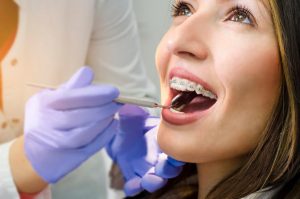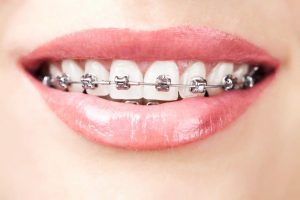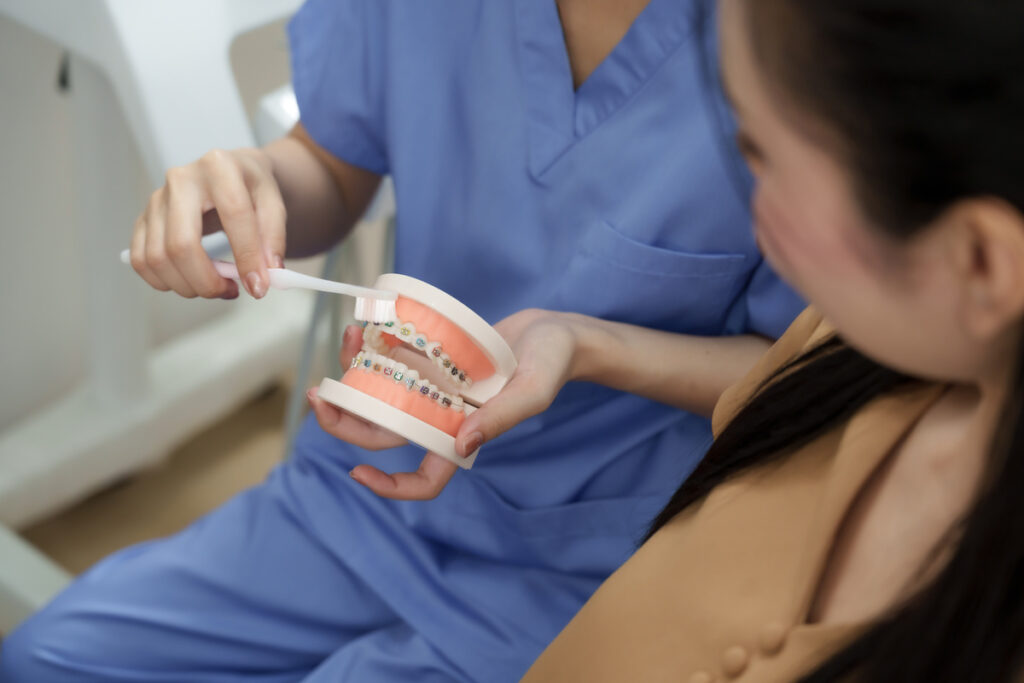Wearing braces can sometimes lead to a dry mouth, but understanding the causes and solutions can make this side effect manageable. Here’s a quick guide to help you stay comfortable while wearing braces.
Quick Facts:
- Main Issue: Braces can reduce saliva production and trap food particles.
- Common Signs: Sticky feeling, bad breath, difficulty swallowing.
- Duration: Dry mouth is usually worst in the first 2-3 weeks.
- Key Solutions: Drink water regularly, try sugar-free mints, and use a humidifier.
Warning Signs That Need Immediate Attention
If you experience any of these, contact your orthodontist as soon as possible:
- Persistent bad breath
- Difficulty eating or swallowing
- Bleeding or swollen gums
- Mouth sores that don’t heal
- Burning sensation in your mouth
Quick Fixes That Actually Work
Managing dry mouth with braces doesn’t have to be complicated or costly. Here are some effective, affordable solutions:
| Solution | Cost | Frequency |
|---|---|---|
| -Water sipping | Free | Every 30-60 mins |
| -Ice chips | $1-2 | As needed |
| -Sugar-free mints | $4-6 | After meals |
| -Dry mouth spray | $8-12 | 2-3x daily |
Let’s break down each of these remedies and why they’re effective.
Water Sipping
Drinking water throughout the day helps maintain moisture in your mouth and keeps your braces and teeth clean. Aim to take small sips every half-hour to an hour.
Ice Chips
Ice chips can be a refreshing way to relieve dry mouth. They keep your mouth cool and provide moisture as they melt.
Sugar-Free Mints
Sugar-free mints, especially those containing xylitol, can help stimulate saliva production without adding sugar, which can stick to braces.
Dry Mouth Spray
Over-the-counter sprays for dry mouth are designed to mimic saliva. Using these sprays a few times a day can keep your mouth moist and comfortable.
Quick tip: Keep notes on what helps YOU most. Everyone’s different, and what works for one person might not work for another.
Why Braces Can Cause Dry Mouth
Braces introduce new elements into your mouth that can interfere with saliva flow:
- Space occupation: Brackets and wires take up extra space in the mouth, which can impact how much saliva flows around your teeth and gums. This reduced space can make it harder for saliva to coat all surfaces, leading to a sensation of dryness.
- Cheek rubbing: Metal brackets and wires often rub against the insides of your cheeks and lips, which can cause irritation and dryness. This discomfort may reduce saliva production as your mouth tries to adapt to the new braces.
- Gum swelling: The initial stages of wearing braces often lead to mild gum swelling, as the mouth adjusts to the brackets and wires. When gums swell, they can block saliva flow, increasing the sensation of dry mouth.
- Food particles: Food can get stuck more easily with braces, and saliva may not flow as freely to clear it away. This blockage can prevent saliva from washing away food particles, leading to an increased risk of dry mouth.
Common Dry Mouth Triggers
Certain daily habits and foods can make dry mouth worse. Be mindful of:
- Sleeping with an open mouth: Leads to a dry mouth upon waking.
- Pain medications: Many reduce saliva production.
- Coffee and tea: Dehydrate the mouth.
- Salty snacks: Draw moisture from the mouth.
- Long conversations: Can leave your mouth extra dry.
Daily Tips for Managing Dry Mouth with Braces
Here are some easy ways to keep your mouth feeling comfortable throughout the day:
- Stay Hydrated: Sip water frequently and use ice chips for relief.
- Sugar-Free Mints: Use after meals to help stimulate saliva production.
- Use a Humidifier: Run one at night (aim for 30-50% humidity) to add moisture to the air.
- Avoid Triggers: Limit caffeine, alcohol, and salty or spicy foods.
- Step Up Oral Care: Use alcohol-free mouthwash, dry mouth toothpaste, and a water flosser for gentle cleaning.
Foods That Help
Certain foods can support natural hydration:
- High-Water Fruits: Try watermelon, cucumber, and pineapple.
- Moist Foods: Soups, smoothies, and yogurt add moisture while being easy on the mouth.
Risks of Dry Mouth with Braces
A dry mouth can lead to additional challenges in braces care and overall oral health:
- Food and Plaque Buildup: Without enough saliva, food and plaque stick to brackets and wires more easily.
- Increased Bacteria: Leads to bad breath and a higher risk of tooth decay.
- Slower Healing: Mouth sores from braces take longer to heal in a dry mouth.
- Gum Disease and Enamel Damage: Saliva protects your teeth and gums, so without it, these areas are more vulnerable.
When to See Your Orthodontist
If dry mouth persists beyond 2 weeks despite trying these home remedies, or if you experience:
- Persistent bad breath
- Difficulty swallowing or eating
- Bleeding or swollen gums
- Unhealing mouth sores or burning sensation
Don’t wait—contact your orthodontist to prevent further complications.
Conclusion
Dry mouth is a common but manageable side effect of wearing braces. By staying hydrated, using simple remedies, and practicing good oral hygiene, you can reduce the discomfort of dry mouth and keep your braces treatment on track. If dryness continues or worsens, don’t hesitate to consult your orthodontist. A little extra care goes a long way in ensuring a comfortable and healthy journey to a straighter smile.
The information provided in this blog is for educational and informational purposes only. It is not intended as a substitute for professional medical, dental, or healthcare advice. Always consult with a qualified healthcare provider for diagnosis, treatment, and answers to specific medical questions.











